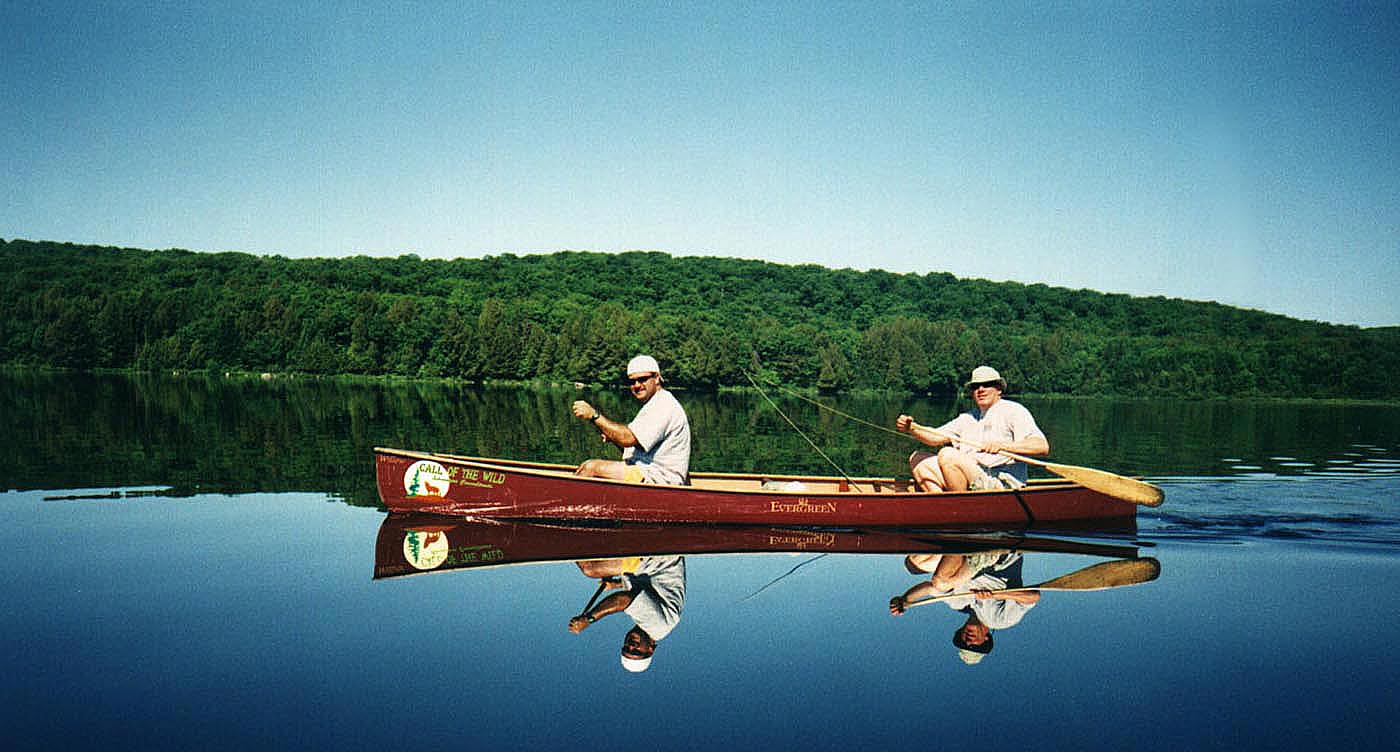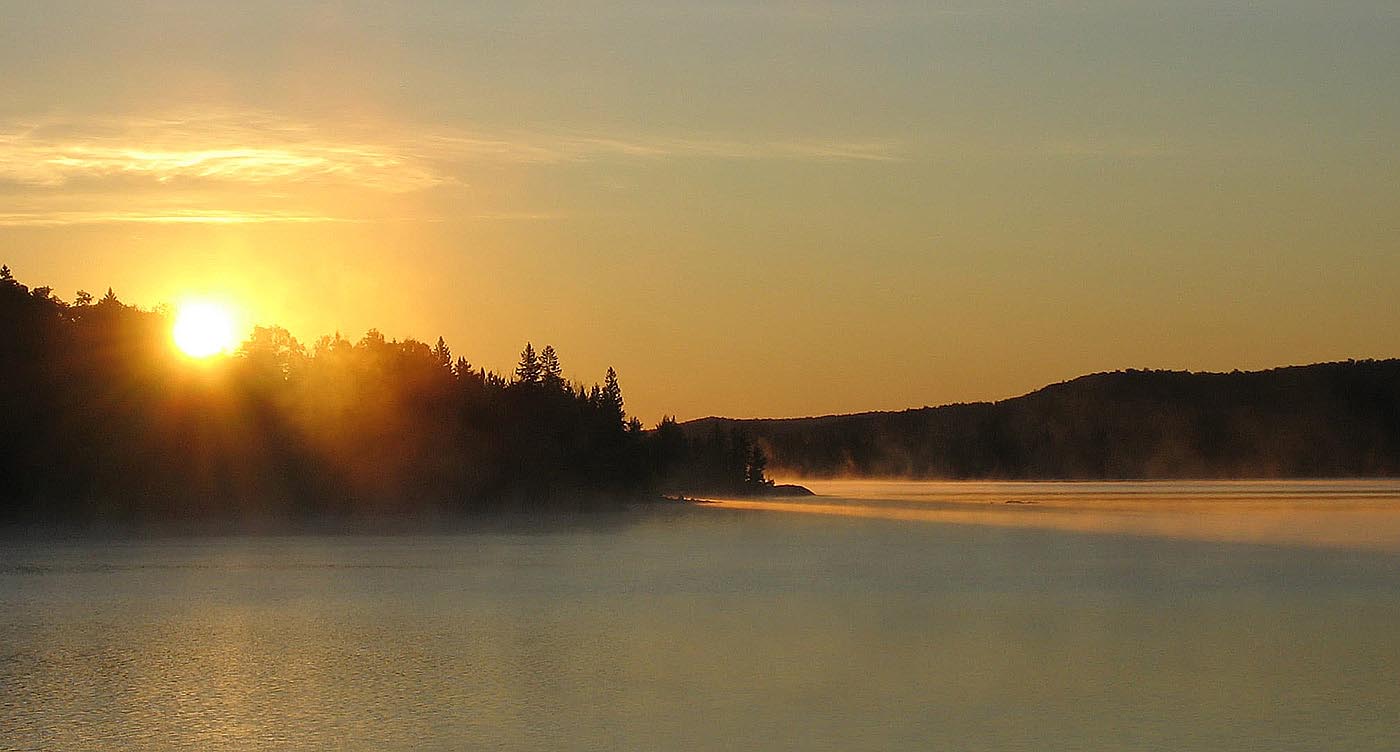Paddling my own Canoe
BY SARAH TUCKER
Some trips mean acquiring more than a tan, as our correspondent learnt in Canada
THE wind chill factor was -10C. The headwinds were vicious and unrelenting. My frozen fingers, sticky with cold, gripped the paddles. It was an unseasonably cold weekend and my 50lb canoe balanced precariously in the middle of a lake in one of the oldest, most stunning and challenging nature parks in Canada. Welcome to the wilderness experience.
I wanted to learn to paddle my own canoe — literally and metaphorically. I wanted to camp under the stars, with wild animals, bears, wolves, moose, the lot. I wanted to learn how to survive under wilderness conditions.
Hundreds of tour operators offer outward bound weekends in the wild, but only a few provide the degree of tuition, variety and fun that Call of the Wild includes in its itineraries.
“You’re a soft adventurer at the moment,” Robin Banerjee, managing director of Call of the Wild, told me after I explained what I wanted from my weekend. “Soft adventurers are the sort of people who climb Kilimanjaro but expect someone else to carry their luggage. Well, I don’t carry your luggage, you carry your own. And you carry your own canoe, do your own cooking, pitch your own tent, light your own fire in all conditions — rain or shine.
“I’m here to give you the guidance and the confidence to enable you to do it for yourself. To survive and smile through it.”
Call of the Wild operates week-long and weekend tours in some of the most spectacular national and provincial parks in Ontario. Don’t be misled by the word “park”. A Canadian park is untamed wilderness, largely accessible only by foot, canoe or on horseback. Some parks are populated by more grizzly, black and brown bears per square mile than anywhere else on the planet.
I was visiting Algonquin Provincial Park, the oldest, largest and best known in Ontario, seven times the size of Hong Kong, with 2,500 freshwater lakes, 260 species of bird, 40 species of mammal, 1,000 species of plant and 20 species of reptile.
The park has an estimated 2,000 black bears and 200 wolves, all of which howl noisily at night. Also with me were eight Dutch women in their twenties and thirties, wanting to “empower” themselves, just like Ginger Spice.
I asked Banerjee why some of the bear-infested areas had no roads that would allow visitors to appreciate the wildlife in relative safety. Roads would disrupt the environment, he said, and if visitors wanted to see the bears, and were accidentally eaten, so be it. He assured me that if visitors were well-prepared and had good guides they would be safe — more or less.
The company sent a list of equipment I should pack for the weekend (no more than 15 items, including a sleeping bag). More importantly, there was a list of things I should leave at home. Once packed, I was able to travel with just hand luggage.
“We never recommend jeans,” said Banerjee. “Always bring a hat, light coloured, and lots of socks, which can double as dirty knicker holders.
“No perfume or aftershave. No one cares what you smell like in the wild, and it also attracts mosquitoes. Leave rings and expensive jewellery at home. Your fingers will shrink in the cold, and rings will fall off when you’re paddling against the headwinds.
“Do bring good walking shoes, sunglasses, a hat or bandanna, mosquito repellent and a sleeping bag that can deal with sub-zero temperatures, just in case. And a good, light rucksack to carry it all in. You have to carry the lot on your back, so think light.”
Before I was allowed in my canoe, Banerjee briefed me on wilderness and canoeing etiquette. I was shown how to hold a paddle (push from the shoulder), how to turn and twist it, what to do in certain weather conditions (never panic), and how to steer a canoe and conserve energy.
My canoe was made of Kevlar, a material used in bullet-proof vests, which made it light but surprisingly strong.
Temperatures the previous weekend had been a respectable 15C (60F), but my Saturday arrived chilly, wet and windy.
The Canadian autumn colours were at their height, however, and lifted my spirits. I paddled from one side of a lake to the other, resting briefly before carrying the canoe on my shoulders to the next lake. I paddled across three lakes each day, taking four to six hours. I occasionally stopped to watch geese flying south in their arrow formations, cackling noisily like Christmas partygoers.
Somehow, the conditions steeled my determination. Each night I was shown how to find campsites protected from the elements. First chores were collecting and sawing wood from trees that had been felled previously and were tinder-dry.
Tents were pitched and nearby areas explored for kindling. Finally, leftover food or supplies for the next night’s camp were packed in bags which were suspended from trees out of the reach of bears.
I ate every scrap of food I was given that weekend. I learnt to rock climb, stretching my legs into positions I thought impossible. My reward on reaching the top of each cliff was incredible views of surrounding parkland.
Robin Banerjee told me about the plants and birds (pointing out the bald eagles) and which berries could be eaten and which should be left for the animals. I watched moose wallowing by the lakeside and found bear tracks, though not the bears. I called for wolves into the early hours. They called back, but, alas, it turned out to be another camp a few miles away who were also calling for wolves. The hounds must have wondered what was going on.
Each evening, my Dutch friends and I would tell ghost stories around the campfire. We had already bonded by sharing food and clothes. On the first night, I got lost in the woods as I attempted to reach the makeshift toilet — a box with a hole in it — which was usually set up on a hill. It was not the most wonderful public convenience, but during the day, at least, it offered unrivalled views of the Algonquin.
My last day was spent in freezing temperatures paddling hard back to our base against an unrelenting headwind.
As the wind lashed my face and my icy fingers stuck to the paddles, I visualised the warm bed at the Westin Harbour Hotel, where I had stayed two nights before, and the warm bath I would spend hours soaking in at the Royal York Hotel that night.
I hadn’t capsized my canoe all weekend. I was glowing with health, felt stronger and was exhilarated by what I had learnt, seen and done.
Sure, I was filthy and reeked of garlic from the food we had eaten and the woodfire smoke that had penetrated every fibre of my clothing, but I had learnt to paddle my own canoe and loved every minute of it.
Need to know
- Getting there: Sarah Tucker flew with Air Canada (0870-524 7226, https://www.aircanada.ca/) from London Heathrow to Toronto. Flights start at £268.
- Where to stay: Sarah stayed at the Westin Harbour Castle Hotel (001 416 869-1600, http://www.westin.com/) in Toronto, where doubles start at around £65 a night, depending on availability and season. At the end of her tour, she treated herself to a night at Toronto’s Royal York Hotel (001 416 368 2511, http://www.fairmont.com/), where standard doubles start at around £94.
- Wilderness trips: Call of the Wild (001 905 471 9453, https://www.callofthewild.ca/) organises trips to Algonquin Provincial Park, about three and a half hours’ drive north of Toronto. Globespan (0870-556 1522) and Canada 4 U (01502 565648) book Call of the Wild trips, plus hotels and flights from the UK. In September, a package which includes the three-day canoe trip, one nights’ hotel accommodation either side of the tour and flights starts at £695 with Canada 4 U. All food, canoe equipment and tents are provided during the tour; in winter, lodging is in heated cabins.
- More information: Algonquin Provincial Park (001 705 633 5572, http://www.algonquinpark.on.ca/).
Testimonials
I had a great time in Algonquin Park with the Call of the Wild group. I still get emails & photos from the other campers. Our continuing enjoyment reflects proudly on your company.
Kevin Arthur
Australia
I would like to thank you for a great weekend, you are very good at what you do. Thanks again and we will definitely refer you to all my friends and co-workers.
Line McKeigan
Toronto, ON
I just wanted to send you a quick “Thank you” for the last weekend. It was way beyond what I expected it to be!! I think everybody had a wonderful time, I know I did!!!!
Elisabeth Eckhardt
Toronto, ON
I wanted to let you know how wonderful the 3 day Algonquin Park canoe trip was. We enjoyed the trip so much that we are considering booking a second 3 day trip in the fall.
Lauren Curtis
Toronto, ON
Thanks for the trip of a life time. I hope to have this experience again…
Teri Fonda
California, USA
Thank you so much for a wonderful few days at Call Of The Wild. The huskying and snow shoe walk were amazing and I would recommend the trip to anyone.
Lisa Chelton
Cayman Islands
I would like to thank you for a great weekend, you are very good at what you do. Thanks again and we will definitely refer you to all my friends and co-workers.
Line McKeigan
Toronto, ON
FOLLOW US ON FACEBOOK


